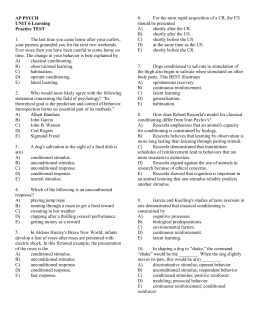

A second view is Nativism, which is associative Noam Chomsky, rejects the idea that learning plays a critical role and it says, we actually are born with rich powerful structure systems in our brain. You've seen this in the last lecture and discussions of behaviors and this was the behaviors idea. A third question is the question of cognitive development, which is, how much of what we know now we're born with, and how much we have to learn? Psychologists, developmental psychologists talk about three different views, one is empiricism, which is we start off empty and then we learn and learn and learn and learn. So, to some extent, as the poetic phrase goes, the child is father to the man. It turns out that when studies are done, a 90 minute interview for three-year-old, does predict personality on certain standard scales, the quality of their personal relationships, whether or not they have a job, criminal behavior and so on. It's an interesting question for instance, how much an interview with a three-year-old can predict the way the three-year-old would turn out.

Either when we were born, because of our genes, or at least but a time or two or three. There's a lot of interest in the extent to which our adult natures, the extent to which the way we are right now, was sort of set in stone. So, you see this handsome child here, and he grows up to be Albert Einstein, or this child who grows up to be a considerably worse adult, one of the worst of them all. Second question has to do with continuity, and what's the relationship between children and adults.

We'll talk about research that explores these very questions later on in the course, and more generally we're going to ask about the state of the art empirically, on children's morality. Children start off good at least in that domain, and then sometimes society makes them worse. To the extent we can become that way is because of the corrupting influence of culture. Then what happens through culture, is that we can be corrupted, and you see this for instance in people, in contemporary discussions we talk about prejudice and racism, and they'll insist that we're not naturally, prejudice or racist. But there's also another view associated with scholars like Jean-Jacques Rousseau, that suggests that we're basically good. So, you may think were immoral because you accept the Christian doctrine of original sin, or the Freudian idea that we are ids, and unrestrained appetites that need to be socialized, so there's a view by scholars like Hobbes and Freud, that we start off as animals, nasty and brutish. So, one question concerns morality and the origin of moral thought, and you could imagine two very different views, one is, that we start off as immoral or at best amoral. I think development and developmental psychology deals with foundational questions that have always puzzled us and that have tremendous intuitive interests.
#SOCIAL QUESTIONS OF DEVELOPMENTAL PSYCHOLOGY PROFESSIONAL#
Everything I talk about in intro psych, I find endlessly interesting, but I have to admit I find development more interesting than most topics, it's something that I've worked on all of my professional life, I continue to study development in my lab at Yale. Charlie bit me and that really hurt Charlie and it's still hurting. What you'll see here will tell you a little bit about morality, about good and evil, kinship, love, sadism, self-control, and most of all, humor. I like this video because it illustrates some central themes that we'll be talking about, and also gives you a chance to look at some real children and how they interact. I want to begin by showing you a movie, one you may have already seen before, it went viral quite a few years ago. The topic of this lecture is Development.


 0 kommentar(er)
0 kommentar(er)
